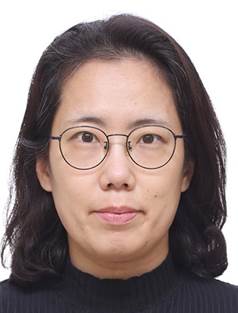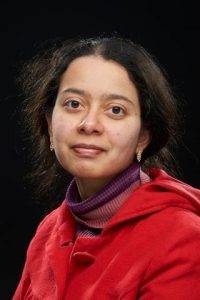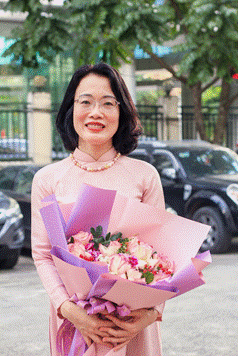1. Myoungjean Bae, Korea Advanced Institute of Science and Technology
https://sites.google.com/view/mjbae
Email: mjbae_at_kaist.ac.kr
Myoungjean Bae is an Associate Professor in the Department of Mathematical Sciences at the Korea Advanced Institute of Science and Technology (KAIST), a position she's held since February 2021. Before joining KAIST, she was a faculty member at POSTECH from 2011-2021, serving as an Assistant Professor initially and then as an Associate Professor. Additionally, she held an Affiliate Professorship at the Korea Institute for Advanced Study (2015-2021) and a Boas Assistant Professorship at Northwestern University (2009-2011). Dr. Bae's expertise is in partial differential equations, with a focus on nonlinear mixed-type PDEs, free boundary problems, mathematical fluid dynamics, and transonic shocks. She received her Ph.D. in Mathematics from the University of Wisconsin-Madison in 2009. Her recent publications include "Prandtl-Meyer Reflection Configurations, Transonic Shocks, and Free Boundary Problems" (Memoirs of the AMS, 2024), and two papers on the Euler-Poisson system published in ARMA: "Subsonic flow for multidimensional Euler-Poisson system" and "Structural stability of Supersonic solutions to the Euler-Poisson system". She is a member of Y-KAST (Young Korean Academy of Science and Technology) and has received numerous awards including the Young Women Mathematician Award (2017), selection as one of 'Young Korean Scientists 30' (2016), the Sang-San Prize for Young Mathematician (2011).
----------------------------------------------------------------------------------------------------------
Title: Transonic Flows and Mixed Type PDEs
Dr. Myoungjean Bae, Department of Mathematical Sciences, KAIST
Republic of Korea
Abstract: Transonic flows in fluid dynamics pose mathematical challenges due to the coexistence of subsonic and supersonic regions. This talk will explore the theory of mixed-type partial differential equations that describe these flows, focusing on their derivation and the implications for solution behavior, including existence, uniqueness, and regularity. If time permits, recent results on sonic interfaces will be presented.
2. Apala Majumdar, University of Strathclyde, United Kingdom
https://www.strath.ac.uk/staff/majumdarapalaprofessor/
Email: apala.majumdar_at_strath.ac.uk

3. Pham Thi Thanh Nga, Vietnam Institute of Meteorology, Hydrology and Climate Change
Email: phamttnga_at_imh.ac.vn

Current position: Director General of the Viet Nam Institute of Meteorology, Hydrology and Climate Change (IMHEN). Chairperson of the RSC-AP.
Education: Graduated in 1997, got Master of Science in Atmospheric Physics and defended a PhD in Science in the Department of Earth and Environmental Sciences in 2008 at Nagoya University, Nagoya, Japan. She was honored with Associate Professor title in 2020.
Experiences: Professional in development of climate change scenarios, climate change impact assessments and risk assessment, science in atmospheric physics. She was the Head of Department of Spatial Informative System and Modelling, Vietnam National Space Center. Vietnam Academy of Science and Technology and the Consultant for the Early Warning System for Natural Disaster Reduction. National Institute for Science and Technology Policy and Strategy Studies (MOST).
Publication: More than 100 papers. She was the co-author of many articles published in famous Journal, specializing in Meteorology and Climatology, Natural Hazards, Prevention and Mitigation of natural disasters.
----------------------------------------------------------------------------------------------------------
Title: “Weather and Climate Services by Harnessing Mathematics: Modelling, Forecasting, and Decision Making”
Abstract: Vietnam, located in the tropical monsoon region with complex topography, is influenced by multiple weather patterns including monsoons, tropical cyclones, and frontal systems. This geographical complexity, combined with climate change, intensifies natural hazards such as typhoons, floods, droughts, and heatwaves, driving non-linear and unpredictable extremes. Despite its high vulnerability, Vietnam’s weather and climate services face significant limitations, with constrained forecasting capabilities and early-stage implementation of the Climate Services. This report highlights the strong potential of advanced mathematics, artificial intelligence (AI), and machine learning (ML) to address these pressing challenges. Mathematical techniques—including optimization, statistical inference, and dynamical modeling—together with AI/ML approaches such as deep learning and ensemble methods, offer promising solutions for improving forecast accuracy, capturing complex atmospheric patterns, and handling high-dimensional, data-scarce environments. Furthermore, integrating AI/ML-enhanced probabilistic forecasts into risk-based decision-making frameworks could significantly strengthen disaster risk reduction strategies and policy planning. Through selected case studies, we demonstrate how the harnessing the potential of mathematics, AI, and ML can advance Vietnam’s weather and climate services, contributing to improved resilience and adaptive capacity in the face of escalating climate risks under the context of climate change.
